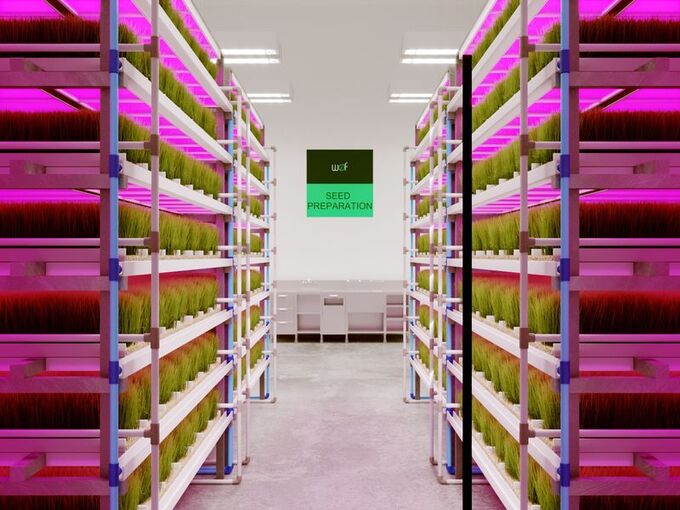June 18, 2025 | 06:45 GMT +7
June 18, 2025 | 06:45 GMT +7
Hotline: 0913.378.918
June 18, 2025 | 06:45 GMT +7
Hotline: 0913.378.918

A rendering of vertical stacks and container of the World of Farming farm.
Source: World of Farming
The United Arab Emirates is turning to vertical farming and hydroponics to produce food for local livestock as the desert nation tries to reduce its reliance on imports and shield itself from disruptions to global supply chains.
Abu Dhabi-based startup World of Farming will begin building on-site operations at local farms later this year to provide fodder for meat and dairy producers that currently rely on imports for as much as 80% to 90% of their animal feed, said Faris Mesmar, chief executive officer of Hatch & Boost Ventures, a venture capital firm that launches and scales its own startups.
“This region doesn’t have a lot of arable land and the dependency on imports is becoming an issue for all local privately held and commercial farms,” said Mesmar in an interview. Local livestock producers “find themselves with no consistent access with food to feed their animals.”
Land or resource-scarce countries from the Middle East to Asia are increasingly seeking to insulate themselves against food shocks and global supply chain disruptions caused by the pandemic, politics and extreme weather. Russia’s invasion of Ukraine has disrupted supplies from one of the world’s top grain exporters, while heat waves have been wilting crops in Europe and the US.
Techniques such as hydroponics, drip irrigation and enclosed cultivation allow desert nations such as the UAE to reduce costly imports of high-value fresh produce. Dubai-based airline Emirates opened what it says is the world’s largest hydroponics farm in July to supply leafy greens for in-flight meals. Hydroponic, vertical farms typically grow plants indoors without soil, irrigating the crops with a water-based nutrient solution and often use artificial light.
Still, it’s rare to find the system used to supply animal feed. World of Farming says its technology offers fodder production with a significantly lower carbon footprint than traditional open-land agriculture and requires less water and space. The venture uses artificial intelligence and imagery to monitor the health and growth rate of plants and can optimize output depending on the changing needs of the animals they will feed.
Feed can represent more than 60% of running costs for animal protein producers, so “if vertical farming can provide a consistently affordable source of feed, it can go a long way in supporting a more resilient food system here in the UAE,” said Greg Ohannessian, co-founder of UAE-based food security consultancy Soma Mater, which has worked on vertical and hydroponics projects.
But while feed grown in vertical farms could be cheaper than imports, there are other options livestock farmers could consider to source local feed, such as creating silage from retail food waste, or producing local grasses that can tolerate high-salinity water, Ohannessian said.
World of Farming plans to build, operate and manage growing operations on private and commercial farms across the Middle East and North Africa, with livestock owners paying a monthly fee for the feed produced. Hatch & Boost has committed to pre-seed World of Farming and is aiming to secure more than $2 million in a fund-raising round later this year.
(Bloomberg)

(VAN) Extensive licensing requirements raise concerns about intellectual property theft.

(VAN) As of Friday, a salmonella outbreak linked to a California egg producer had sickened at least 79 people. Of the infected people, 21 hospitalizations were reported, U.S. health officials said.

(VAN) With the war ongoing, many Ukrainian farmers and rural farming families face limited access to their land due to mines and lack the financial resources to purchase needed agricultural inputs.

(VAN) Vikas Rambal has quietly built a $5 billion business empire in manufacturing, property and solar, and catapulted onto the Rich List.

(VAN) Available cropland now at less than five percent, according to latest geospatial assessment from FAO and UNOSAT.

(VAN) Alt Carbon has raised $12 million in a seed round as it plans to scale its carbon dioxide removal work in the South Asian nation.

(VAN) Attempts to bring down the price of the Japanese staple have had little effect amid a cost-of-living crisis.